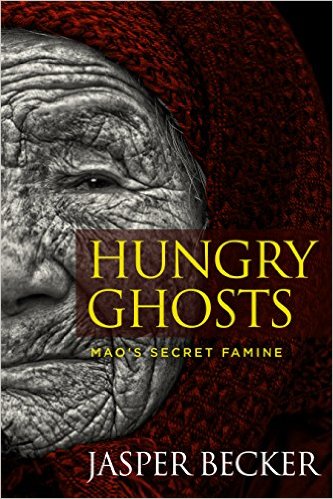
HUNGRY GHOSTS—MAO’S SECRET FAMINE
BY JASPER BECKER (PUBLISHED 1996 BY THE FREE PRESS, SIMON AND SCHUSTER 352 pages)
Every once in a while a truly revolutionary book on history comes along, one that destroys previous misconceptions and completely alters our understanding of a given time and place. Such a book is Hungry Ghosts. Author Jasper Becker, a journalist living in Beijing, has forever shattered the positive, benevolent image of Mao Zedong which far too many people in this supposedly enlightened age, still embrace.
Becker is the first Westerner to try to find out the real story of China’s 1958-1962 “Great Leap forward.” His book, based on countless interviews of survivors of this time period and its famine, is a graphic and gruesome tale of suffering, starvation, political corruption, death and even cannibalism. It illustrates how social utopianism, coupled with a despotic totalitarian state, far from creating an idyllic social paradise, can instead unleash the worst of human passions and create a veritable hell on earth.
The author begins by going back into antiquity in order to demonstrate how hunger and periodic famines are a recurring theme in Chinese history. This is essential not only to provide us with a foundational basis for understanding the Great Famine of Mao, but also to enable us to understand the people’s reaction to it. Becker describes how the Chinese accepted every “jot and tittle” of Soviet ideology, particularly its bizarre farming “innovations.” The utter failure of this system in the country that spawned it did not seem to trouble China’s leaders one whit. Indeed, Mao’s chief concern throughout his lifetime was to impress the rest of the world with his genius and methods. The resulting propaganda coup has to this day affected the views most people, who should certainly know better, have of Mao and his policies.
Rather than a utopian paradise, the Great Leap Forward resulted in unparalleled starvation in China. Reports of widespread suffering and death rarely reached the Chairman’s ears, however. Moreover, the entire Chinese ruling elite seemed determined to keep the real nature of the famine from the outside world. There was indeed a collectivist impulse among the Chinese leaders; they were all (with perhaps a few exceptions) spreading the same Communist falsehoods as their neighbors to the north, ignoring the plight of the very real people in their provinces. These Communist leaders and sympathizers suffered from the same collectivist insanity that has not disappeared to this day.
Becker estimates that perhaps as many as sixty million Chinese may have perished due to the “Great Leap Forward.” Today, additional research has hiked this horrific number much higher, perhaps even exceeding one hundred million. Even the conservative figure is higher than all the deaths caused by Hitler and Stalin combined.
The role of superstition and illiteracy among the Chinese peasants is crucially important in understanding all this. To this day, few Chinese have access to higher education. The author mentions newspaper accounts of Chinese who were still slaughtering animals to bring on rain, and of various primitive religious rituals still being practiced. In fact the religious/collectivist impulse is a recurring theme in Chinese history. For example, the Taiping rebellion of 1851 was brought about by a peasant who claimed to be the brother of Christ. The end result: Twenty million Chinese deaths.
The relationship between religion and statism becomes more pronounced the further we read. It is fundamentalist religious ideology, with and emphasis on self-sacrifice, the denigration of self esteem (still called the sin of pride) and, perhaps most importantly here, the promotion of a tribalist mentality, to the detriment of the individual which enables people to become acclimated to fanatical totalitarian ideologies, be they secular or religious.
While not a book on religion per se, Becker’s Hungry Ghosts serves as a most compelling indictment not only of any kind of totalitarian regime, but of the anti-life religious thinking that can produce them.
Categories: Book Reviews
